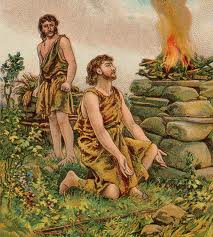Lessons from the Story of Abel and Cain

Storytelling is one of the major approaches used by the Qur’an to convey God's message. Since the Qur’an is meant for all ages until the Day of Judgment, the stories referenced in the Qur’an will continue to apply no matter how lifestyles change. Here we will focus on a very important story that brings together many different concepts: the story of the sons of Prophet Adam (peace be upon him), Abel and Cain.
The Story
God tells the story of Abel and Cain in Surah al-Maa'ida (5:27-31).
Both Abel and Cain attempted to offer a sacrifice to God. Abel owned livestock, while Cain owned crops. Abel chose one of his best sheep and sacrificed it to God. Meanwhile, Cain chose his worst and spoiled crops and offered them to God. Each brought his sacrifice to a mountain. The sign of acceptance of the sacrifice was that a fire would come and burn it. The fire indeed came, ate up Abel's offering, and left Cain's. This made Cain envious of his brother, and he vowed to kill him. Narrations talk about how Satan was the one to teach Cain how to kill Abel. Cain took two stones and struck the head of Abel until he died. Cain did not know what to do with the body until God send along two crows. Cain observed as the two crows fought, and one killed the other. The living crow then buried the body of the dead crow. Cain imitated the crows and buried the body of his brother Abel. (Bihar al-Anwar)
Acceptance of our Deeds
The above story sheds light on various topics, three of which will be discussed: acceptance of our deeds, envy, and sources of knowledge.
Many Muslims abide by the teachings of Islam. However, just carrying out an act of worship does not mean that God will accept it. Not every prayer is accepted, and not every fast is valid. There is a set of conditions for each act of worship that needs to be fulfilled for God to accept that act. For example, a prayer without ablution is not accepted, even if all other conditions are fulfilled.
Through the story of Abel and Cain, God has given a measuring stick for acceptance of deeds. The reference point that differentiates the accepted deeds from the rejected ones is none other than Taqwa.
The Qur’an says, "Indeed, God only accepts from those who are conscious of God." (5:27) The Arabic form of the verse uses the words innama, which helps communicate absolute restriction. That is, God-consciousness is the only attribute that can lead to acceptance of deeds, and without it, no deed can be accepted.
In the context of Abel and Cain's story, God-consciousness was shown in the choices each made for his sacrifice. Abel chose the best of his sheep. He chose the sheep that he depended on more. He chose the sheep that mattered to him more. On the other hands, Cain chose the crops that were spoiled. He chose the crops that he would not be using anyway. He chose the crops that he would eventually get rid of.
Abel's choice is a reflection of the level of understanding and God-consciousness that exists within him. Sacrificing his best sheep demonstrates that Abel had complete submission to God, and that all that he has was for God. How many of us today are willing to give away our new clothes in the way of God?
Looking at the life of Ahl-ul-Bayt (peace be upon them), we find similar examples. Lady Fatima (peace be upon her) gave out her wedding dress on her first day of marriage. When the Prophet asked, she quoted the following verse, "Never will you attain the good [reward] until you spend [in the way of Allah] from that which you love." (3:92)
This is just an example of spending something materialistic, but of course, the Ahl-ul-Bayt gave their own lives and more in the way of God, and that can only be achieved with a high level of God-consciousness.
Source: shafaqna
Add new comment